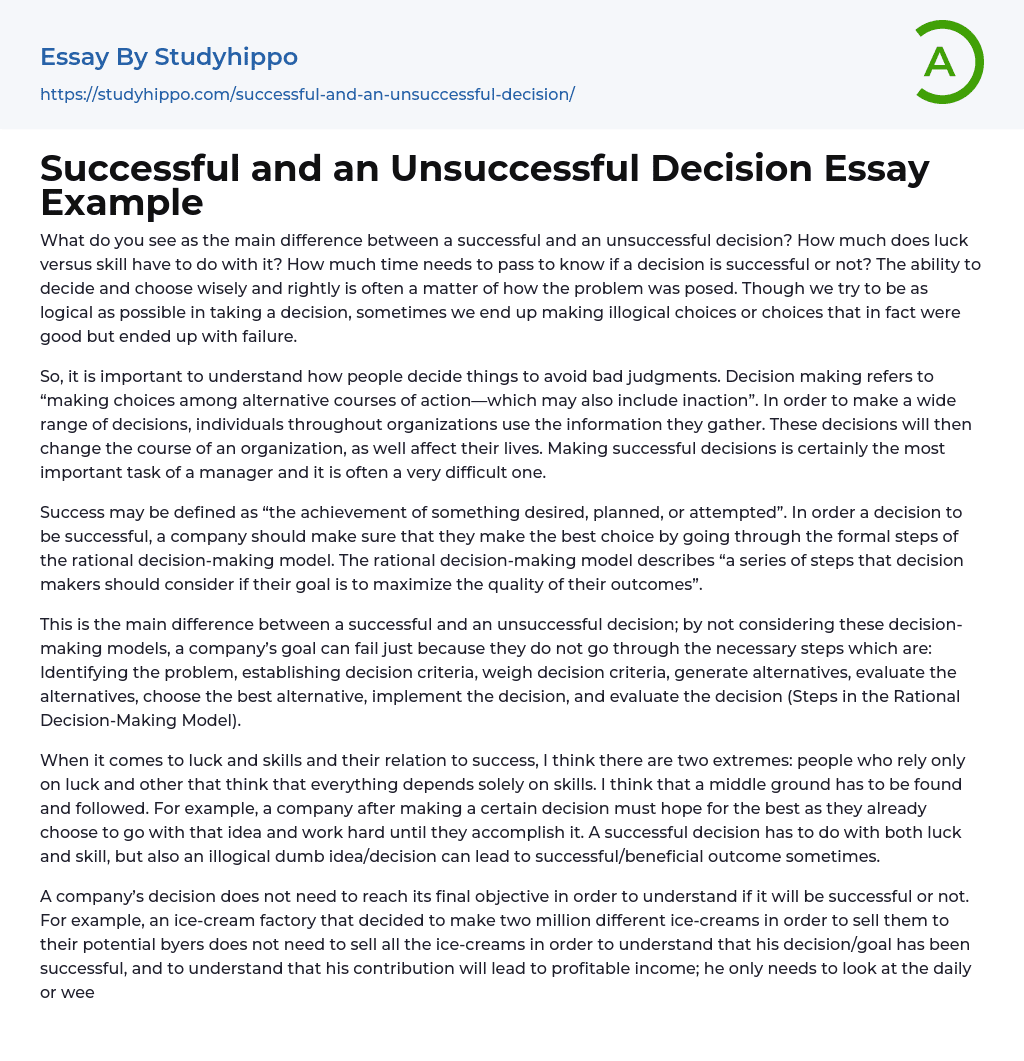What do you see as the main difference between a successful and an unsuccessful decision? How much does luck versus skill have to do with it? How much time needs to pass to know if a decision is successful or not? The ability to decide and choose wisely and rightly is often a matter of how the problem was posed. Though we try to be as logical as possible in taking a decision, sometimes we end up making illogical choices or choices that in fact were good but ended up with failure.
So, it is important to understand how people decide things to avoid bad judgments. Decision making refers to “making choices among alternative courses of action—which may also include inaction”. In order to make a wide range of decisions, individuals throughout organizations use the information they gather. These decisions will then change the c
...ourse of an organization, as well affect their lives. Making successful decisions is certainly the most important task of a manager and it is often a very difficult one.
Success may be defined as “the achievement of something desired, planned, or attempted”. In order a decision to be successful, a company should make sure that they make the best choice by going through the formal steps of the rational decision-making model. The rational decision-making model describes “a series of steps that decision makers should consider if their goal is to maximize the quality of their outcomes”.
This is the main difference between a successful and an unsuccessful decision; by not considering these decision-making models, a company’s goal can fail just because they do not go through the necessary steps which are: Identifyin
the problem, establishing decision criteria, weigh decision criteria, generate alternatives, evaluate the alternatives, choose the best alternative, implement the decision, and evaluate the decision (Steps in the Rational Decision-Making Model).
When it comes to luck and skills and their relation to success, I think there are two extremes: people who rely only on luck and other that think that everything depends solely on skills. I think that a middle ground has to be found and followed. For example, a company after making a certain decision must hope for the best as they already choose to go with that idea and work hard until they accomplish it. A successful decision has to do with both luck and skill, but also an illogical dumb idea/decision can lead to successful/beneficial outcome sometimes.
A company’s decision does not need to reach its final objective in order to understand if it will be successful or not. For example, an ice-cream factory that decided to make two million different ice-creams in order to sell them to their potential byers does not need to sell all the ice-creams in order to understand that his decision/goal has been successful, and to understand that his contribution will lead to profitable income; he only needs to look at the daily or weekly sales, and see if this number of sales is enough for the two million different ice-creams to be sold during the expect time.
An organized and systematic decision-making process usually leads to better successful decisions. Without a well-defined process, you risk making decisions that are based on insufficient information and analysis. Many variables affect the final impact of your decision.
However, if you establish strong foundations for decision making, generate good alternatives, evaluate these alternatives rigorously, and then check your decision-making process, you will improve the quality of your decisions.
- Research Methods essays
- Experiment essays
- Hypothesis essays
- Observation essays
- Qualitative Research essays
- Theory essays
- Explorer essays
- Accident essays
- Awareness essays
- Benefits of Volunteering essays
- Challenges essays
- Childhood Memories essays
- Decision essays
- Driving essays
- Event essays
- Excellence essays
- Expectations essays
- Failure essays
- Farewell essays
- Flight essays
- Gift essays
- Growing Up essays
- Ignorance essays
- Improve essays
- Incident essays
- Knowledge essays
- Luck essays
- Memories essays
- Mistake essays
- Obstacles essays
- Overcoming Challenges essays
- Party essays
- Peace Corps essays
- Personal Experience essays
- Problems essays
- Sacrifices essays
- Struggle essays
- Success essays
- Trust essays
- Vacation essays
- Visit essays
- Volunteering essays
- Agriculture essays
- Albert einstein essays
- Animals essays
- Archaeology essays
- Bear essays
- Biology essays
- Birds essays
- Butterfly essays




